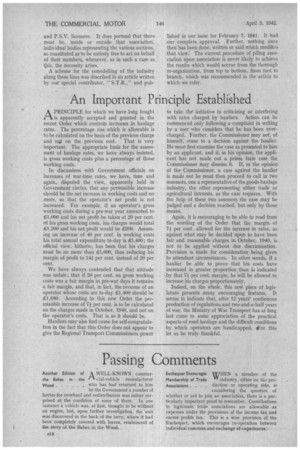An Important Principle Established
Page 16

If you've noticed an error in this article please click here to report it so we can fix it.
A PRINCIPLE for which we have long fought is apparently accepted and granted in the recent Order which controls increases in haulage rates. The percentage rise which is allowable is to be calculated on the basis of the previous charge and nig on the previous cost. That is very important. The appropriate basis for the assessment of haulage rates, we have always insisted, is gross working costs plus a percentage of those working costs.
In discussions with Government officials on increases of war-time rates, we have, time and again, disputed the view, apparently held in Government circles, that any permissible increase should be the net increase in working costs and no more, so that the operator's net profit is not increased. For example, if an operator's gross working costs during a pre-War year amounted to 1,000 and his net profit be taken at 20 per cent. of his gross working costs, his charges would total 1,200 and his net profit would be 2200. Assuming an increase of 40 per cent, in working costs his total annual expenditure to-day is £1,400; the official view, hitherto, has been that his charges must be no more than £1,600, thus reducing his margin of profit to 14i per cent. instead of 20 per cent.
We have always contended that that attitude was unfair ; that if 20 per cent, on gross working costs was a fair margin in pre-war days it remains a fair margin, and that, in fact, the revenue of an operator whose costs are to-day £1,400 should be £1,680. According to this new Order the permissible increase of 74 per cent. is to be calculated on the charges made in October, 1940, and not on the operator's costs. That is as it should be.
Hauliers may also find cause for self-congratulation in the fact that this Order does not appear to give the Regional Transport Commissioners power to take the initiative in criticizing or interfering with rates charged by hauliers. Action can be commenced only following a complaint in writing by a user who considers that he has been overcharged. Further, the Commissioner may not, of himself, come to a decision against the haulier. He must first examine the case as presented to him by an applicant, and if, in his opinion, the applicant has not made out a prima facie case the Commissioner may dismiss it. If, in the opinion of the Commissioner, a case against the haulier is made out he must then proceed to call in two assessors, one a representative of the goods-haulage industry, the other representing either trade or agricultural interests, as the case requires. With the help of these two assessors the case may be judged and a decision reached, but only by those means.
Again, it is encouraging to be able to read from the wording of the Order that the margin of 7-.1 per cent. allowed for the increase in rates, as against what may be decided upon to have been fair and reasonable charges in October, 1940, is., not to be applied without due discrimination. Provision is made for consideration being given to attendant circumstances. In other words, if a haulier be able to prove that his costs have increased in greater proportion, than is indicated by that 7 per cent, margin, he will be allowed to increase his charges proportionately.
Indeed, on the whole, this neW piece of legislature presents many encouraging features. It seems to indicate that, after 12 years' continuous production of regulations and two-and-a-half years of war, the Ministry of War Transport has at long last come to some appreciation of the practical aspects of road haulage and the difficult conditions by which operators are handicapped. oFor this let us be truly thankful,




















































